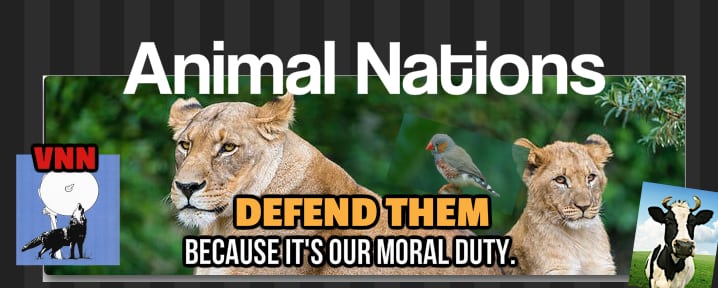Published on Apr 25, 2012
I found this mother duck and her 10 ducklings in my backyard swimming pool this morning. The mother, who has visited before with her mate, had no trouble getting out, but the ducklings were not able to climb out of the pool. My friend Brian and I spent more than an hour creating ramps on which the ducklings could climb out, but they refused to use them. Then Brian scooped up the ducklings with a pool net, but the mother stayed in the pool and the ducklings jumped back in to be with her. Finally, we put a ceramic turtle and some lava rocks from my fire pit on the top step of the pool and chased the mother in that direction. The mother jumped out, and the ducklings eventually figured out how to climb the turtle and rocks to safely escape.
Feel like doing more? Below a very useful piece we spotted on ANIMAL PEOPLE FORUM. Note the same applies to political activism in general.
[dropcap]A[/dropcap]s animal lovers, we often wish we could do more to help our fellow friends in need. But it can often feel like there isn’t enough time in the day to dedicate to making a real difference. Though it may seem this way, it isn’t necessarily the case. Given modern technology, there are all sorts of things that we as individuals can do in a short amount of time. A single click of your computer mouse has never been more powerful. If you ever find yourself with a spare hour, here are 6 easy ways to help animals online.
Sign online petitions
It’s upsetting to think about how much animal abuse goes on in the world, whether against domestic pets and livestock or wildlife and endangered species. Human interference is causing suffering and extinction on a massive scale. Signing petitions that bring these issues to light is just one way that you can make a difference for animals online.
Change.org and thepetitionsite.com are two popular petition platforms where you can sign existing petitions, and also create your own. These petitions can then be shared across your social media channels. While it may seem like an ‘armchair activist’ approach, every additional signature makes a difference. Consider the following:
- To be searchable within WhiteHouse.gov, a petition must get 150 signatures in 30 days
- To require a response, a petition must reach 100,000 signatures within 30 days
You could be one of those 150 or 100,000 signatures.
Shop using AmazonSmile
Most of us already shop online, whether it’s through Amazon or another site. If you’re using it anyway, you may as well make a positive difference at the same time. When you sign up with AmazonSmile, 0.5% of the purchase price goes to your selected charity at no extra cost to you. And there are many animal charities included in this list to choose from. [Never mind that Amazon is in many ways an evil company that works hand in hand with the CIA and pays slave wages—these days the whole system is rigged like that and Amazon is everywhere. Extract a bit of good out of them, if you can. —Eds.]
In addition, there is iGive, which works in a similar way but without limiting you to Amazon.com. It’s arguably a preferable alternative, since there are over 1,400 affiliated stores, and it donates around 3% towards your chosen charity instead of just 0.5%. All of this is at no extra cost to you, the customer.
Donate your skills
Do you have something valuable to offer an animal welfare organization? Perhaps you’re the crafty type, capable of making toys and bedding for shelter pets. You could donate these to your local shelter, or alternatively sell them online and donate the profits. Shelters are often in need of volunteers with writing, web design, or social media skills who can help to update adoption profiles for pets in need of homes, among other things. Getting the word out online is one of the most important tasks in ensuring the success of these organizations, so even if you can only donate one hour per week, you could make a significant difference.
Spread the word on social media
Sharing animal abuse stories on social media in order to incite action can be tricky. On the one hand, of course it’s important to spread awareness so that people know what’s going on – and to shed light on the less well-known problems as well. Issues like deforestation often get far less attention than dog abuse, for example. On the other hand, constantly sharing petitions and fundraisers on your Facebook profile can sometimes have the opposite effect to the one intended.
Why? Because the fact is, most people don’t want to see this content on their news feeds. They come to social media for light entertainment – funny videos and weird memes – not to feel depressed about the sad plight of animals. Instead of sharing too much on your personal profile, consider creating a page or group where you can share content with like-minded people – not just your friends, but others as well. There are still opportunities to share with your personal community, but you need to pick your moments and do so in a measured and thoughtful way that won’t simply result in you being unfollowed.
Buy cruelty-free products
Whether we’re shopping online or offline, the products we choose to buy impact consumer demand and cast a vote for the kind of world we want to live in. If you love animals, you probably agree that they shouldn’t be tortured for the purposes of testing drugs and cosmetics. Yet in labs across the country, this is happening all the time – so that we can have shampoo, lip balms, and glitzy eyeliners. As if there weren’t enough options out there already.
PETA has a list of great cruelty-free companies that you can use to inform your purchasing decisions, including brands like Lush, Aveda, and Urban Decay. Likewise, Buzzfeed has a comprehensive guide to finding products: 186 Easy Ways To Buy Cruelty-Free And Vegan Beauty Products Online. We all need to be more aware of how our money is being spent, and subsequently the kind of world we’re funding in the process.
Check out our nine tips for shopping animal-free.
Fill out wildlife surveys
When the public gets involved with logging wildlife data, this can be a massive help to scientists working to promote conservation efforts. It takes very little time and can involve all sorts of activities, from keeping track of the native birds in your garden to laying down a white sheet and seeing how many different types of bugs are drawn to its glare. With handy apps like iNaturalist, you can even record and share wildlife sightings on your smartphone. Visit the National Biodiversity Network (or a local equivalent) to find a survey or scheme you can get involved with today.
While some might disparagingly call it ‘slacktivism’, getting involved in online activism is far better than doing nothing at all – and since we spend so much time online and using social media already, the Internet is increasingly the medium of choice for activists seeking to raise awareness and generate movements. Times are certainly changing, and each of us has the power to make a difference. There’s nothing stopping you from working your online magic and volunteering in the real world too. Let us know how you get on!
Kayleigh Alexandra is a content writer for Micro Startups — a site that donates all of its web revenue to charities supporting startups, entrepreneurs, and other worthy causes. Check out the blog for your latest dose of growth hacking news. Follow us on Twitter @getmicrostarted.
Featured image credit Daniel Frank / Pexels.







Got an Hour? Here Are 6 Easy Ways to Help Animals… no gimmicks required – no cute stories about ducklings… All that it takes is a complete end of moral & financial support for the religion that preach and thrive on violence to animals: judaism, christianity & islam… Any other gesture just creates a sham illusion that compassion is possible with the holy trinity of animal terror: “A while ago, I was interviewed about the awful record of Christianity on animals in comparison with Jainism, and I commented that Jainism in its care and respect for creation has more understood… Read more »